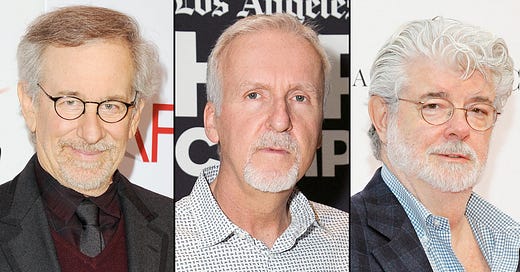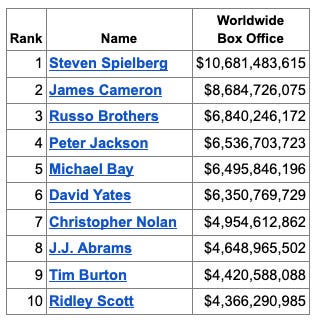The Highest Grossing Directors of All Time
What happens if we adjust for inflation and get rid of all the IP?
Movies Are Therapy posted a video with the top ten highest grossing directors and it got me thinking.
What would happen if we adjusted these figures for inflation?
What would happen if we took out all the IP?
It’s clear that both of these hypotheticals would shift this list considerably, but I was curious to see how it would play out. So let’s run the numbers and take a look.
Inflation
This was the easier of the two questions to untangle but still required a little bit of legwork. Immediately it became apparent that there are no good data sources that I could use to get what I needed easily, so unfortunately it was a manual process.
In order to adjust the director totals for inflation, I needed to separate out each individual film, and tie it to a release year as well as the appropriate director. Then I needed to source the relevant inflation figures to convert the box office from whenever the film in question released into today’s dollars.
I also realized that since this list would be so impacted by this exercise I needed more than just the films from the top ten directors. So I pulled the data from the top 29:
I went through the filmography of each of these directors, pulled their films into a separate sheet, along with the release year and total global box office for the film. For example, here’s a snapshot from the Steven Spielberg’s section of the sheet:
When I finished that step for all the directors on this list I had information for 406 films. The next step was converting the box office figures from whichever year the respective films released into today’s dollars.
I sourced the inflation figures from the U.S. Bureau of Labor Statistics, building another table with every year from 1971 through 2022, and the value today of what $1 would have been in each of those years. So for example:
We can see above that Jaws released in 1975.
The value of $1 in 1975 would be roughly equivalent to $5.77 today. That allows us to work out that while Jaws earned $476,500,000 in 1975, that would be the equivalent of roughly $2.74 billion in today’s dollars.
Doing that same calculation for every film on the list gives us a new top fifteen:
A few things stood out to me here:
The larger gap between Spielberg and Cameron.
These top two spots didn’t change, but the distance between their figures changed quite a bit. Before we adjusted for inflation, Spielberg was only ahead of Cameron by about $2 billion. After we adjust for inflation, we see that Spielberg’s total is almost double Cameron’s ($24.2B compared to $13.6B).
The Russo Brothers and David Yates both dropped down the ranking but stayed in the top ten, while Christopher Nolan, J. J. Abrams, Tim Burton, and Ridley Scott all left the top ten.
J. J. Abrams had the largest drop of all the directors on the list, going from #8 all the way down to #17.
George Lucas was the greatest beneficiary of this exercise.
In the original list he was at #22, but simply adjusting for inflation puts him at #5.
The shifts can be seen in the table below. The left column has the original order before we adjusted for inflation. The middle column (titled “Movement”) reflects the change of the name directly to the left. And the right column has the new order.
The other thing I found interesting while running these numbers was looking at the average per film.
By this measure, Spielberg’s prolific career works against him, whereas George Lucas jumps to the top of the list.
But if I’m being honest, I think the real fun is what happens when we strip away the IP.
Taking Away the Intellectual Property
We’re going to use the new inflation adjusted list as our baseline as we start removing IP to see how that changes things.
Without even running the numbers there are obvious directors on the list that we know are going to lose their positions.
Peter Jackson is likely gone, because he’ll lose The Lord of the Rings.
We know David Yates and the Russo Brothers are gone as they lose the Harry Potter and MCU films respectively.
Michael Bay could be hurt by losing the Transformers franchise, but he has some other larger films that aren’t based on IP that could keep him in the running.
As far as directors moving up, I think it’s safe to say that M. Night Shyamalan will benefit, since most of his work is original. Roland Emmerich also seems like a sure candidate for elevation.
I also predict we will see a few animation directors in the top ten, since we know we’ll be seeing films like The Incredibles (1 and 2), the Despicable Me franchise, etc.
For this first round let’s take out anything with even a whiff of IP, with the one exception being if the director in question originated that franchise. So George Lucas gets credit for all of the Star Wars he directed, but J. J. Abrams does not.
James Cameron gets credit for both Avatar and Terminator films, but not for Aliens. Ridley Scott, however, who directed Alien, Prometheus, and Alien Covenant, would get credit for all three of those films.
We are starting off with $213 billion in total box office receipts(adjusted for inflation), and when we remove all of the IP, we are left with only $73 billion. Now this list includes sequels, so they aren’t all “original” films, but these franchises, such as Star Wars, Alien, or Avatar, are not based on any other property, they aren’t adaptations of books, comics, old TV shows, or remakes of foreign films. And we are only counting the sequel here if it was directed by the same person who did the original, essentially creating a new franchise in the process.
This is the new list based on this first round of IP removal:
Steven Spielberg stays on top!
George Lucas’s box office numbers DO NOT CHANGE.
James Cameron also retains a significant proportion of his box office figures.
We see three animation directors: Pierre Coffin and Chris Renaud (both worked on the Despicable Me franchise and other Illumination projects) and Brad Bird, who makes it into the top ten with just three films (The Incredibles, Ratatouille, and Incredibles 2).
Robert Zemeckis owes his rise primarily to the Back to the Future franchise, and Cast Away.
Rolan Emmerich is in large part in the top ten due to Independence Day and 2012.
The only thing missing from Shyamalan’s new total is The Last Airbender.
Todd Phillips doesn’t get credit for Joker, but he almost breaks the top ten with the Hangover trilogy.
Christopher Nolan finds himself still in the top fifteen because of three films (Inception, Interstellar, and Tenet).
The original top ten directors accounted for $108 billion in box office receipts. That same group of ten without any IP? Down to $39 billion.
Peter Jackson goes from almost $10 billion to $68 million. That’s million with an “m.”
David Yates goes from $8.6 billion to $0.
But what if we allowed a little IP, as a treat?
Would that change things a lot?
We will keep out the big franchises, books, TV and comics series, but how about allowing movies based on Disney rides? Or historical events that aren’t based on other books (fiction or non-fiction)?
This is the only scenario where James Cameron gets into the #1 spot, and that’s because of Titanic.
Spielberg gets a little bump from stuff like Amistad, Saving Private Ryan, and Bridge of Spies.
George Lucas’s total remains unchanged (!).
Roland Emmerich gets a bump from The Patriot.
Gore Verbinski makes a big jump because of the Pirates of the Caribbean films.
Ridley Scott’s big addition in this category is Gladiator, but he also gets a little help from Kingdom of Heaven and Exodus: Gods and Kings.
If we let in just a LITTLE bit more, say anything based on an individual book or film (not a series of books or comics), then Ridley Scott moves up again, as he gets credit for another ten of his films based on individual books, with the difference maker being The Martian, at $813 million.
Clint Eastwood finally gets into the mix, adding back a whopping 22 films, the biggest being American Sniper, which was based on the memoir.
And then we’ve got Ron Howard who brings back 11 of his films, with the largest being Apollo 13, which was based on a non-fiction book, and Ransom, which is essentially adapting the 1956 film of the same name.
If we wanted to compare all four of these scenarios, and how they impact the order of the lists, it would look a little like this:
The only conclusion I’m ready to draw at this point is that Steven Spielberg is probably the greatest of all time.
In the meantime, now that I have all this data at my fingertips, let me know if you have any specific questions you’d like me to explore, and leave a comment with your thoughts.
Thanks for reading!

















Interesting analysis. Reminded me just a bit of the Economist’s Big Mac Index as a way of judging if a currency is over- or undervalued based on local Big Mac prices around the world.
I’m trying to think of a real-world use for your list.
I don’t know who all these directors are, but it looks like most are American or British. Surely there are directors in Korea or China or Nigeria or someplace that have made high-grossing films. Or is that just a Hollywood/bigtime-investor phenomenon?
And no Scorsese? No Joel and Ethan Coen? Wild.
I suppose another analysis would be to look at the ratio of box office gross to budget. That would favor directors who did low-budget pictures that hit it big. Although I suppose it’s bottom line that matters to just about everyone, not ratio.
I like letting in a little IP here and there since some directors can do a lot with it while others don’t and it flops. I don’t have an example of beloved IP flopping in the hands of an incompetent director but there must be some.